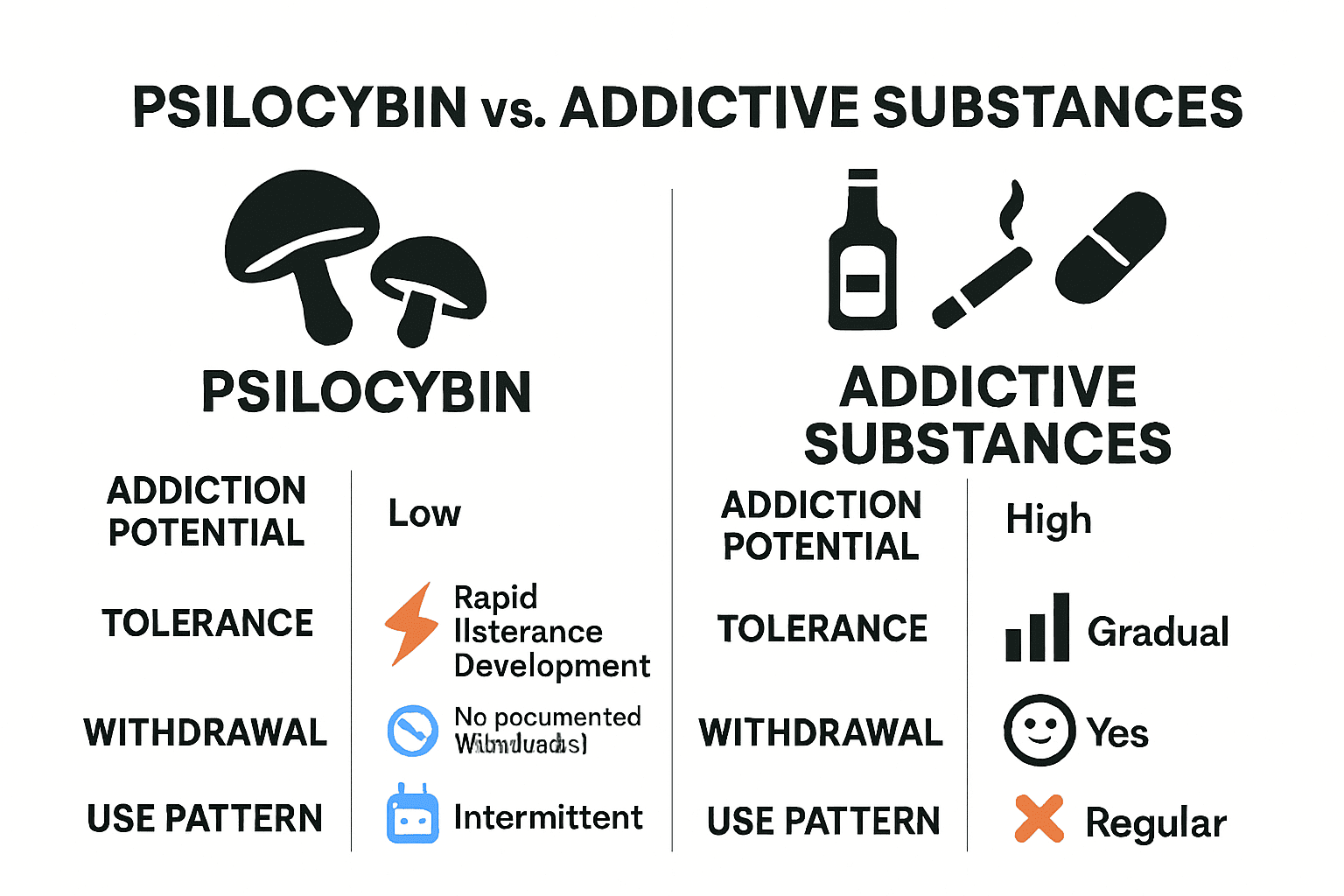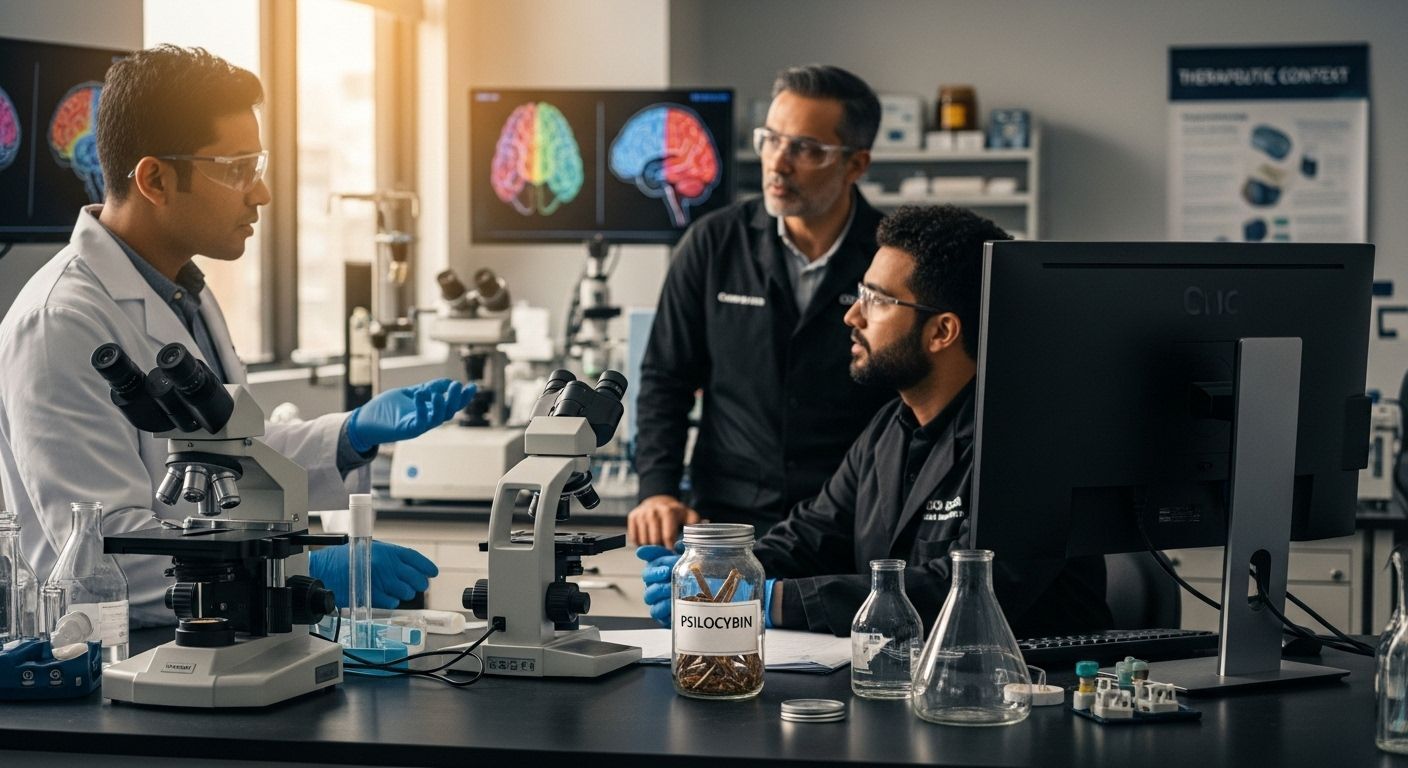Psilocybin is popping up everywhere in mental health conversations and some claim it may help where other treatments have failed. You might expect a substance like this to raise alarms about addiction but here is what stands out. Research shows psilocybin is non-addictive and offers rapid tolerance development that actually discourages repeated use. Most substances spark cravings or dependency yet this psychedelic seems to play by completely different rules.
Table of Contents
- Understanding Psilocybin And Its Effects
- Is Psilocybin Addictive? Research And Facts
- Psilocybin Microdosing: Habit Forming Or Safe?
- Legal, Wellness, And Safe Access In Canada
Quick Summary
| Takeaway | Explanation |
|---|---|
| Psilocybin is non-addictive. | Research shows psilocybin does not trigger neurological patterns associated with addiction, unlike many other substances. |
| Microdosing minimizes addiction risks. | Microdosing involves tiny doses that encourage neuroplasticity without producing dependence, along with structured consumption protocols. |
| Psilocybin offers therapeutic potential. | Clinical studies indicate psilocybin may effectively treat mental health conditions such as depression and anxiety. |
| Rapid tolerance discourages frequent use. | Repeated psilocybin use quickly reduces its effects, minimizing cravings and preventing habit formation. |
| Responsible use is crucial for safety. | Engaging with psilocybin should be intentional and guided by healthcare professionals to ensure safe and effective experiences. |
Understanding Psilocybin and Its Effects
Psilocybin represents a complex psychoactive compound found naturally in certain mushroom species, sparking significant scientific interest for its profound neurological interactions. Understanding its mechanisms requires exploring how this molecule fundamentally transforms brain function and perception.
The Neurological Landscape of Psilocybin
Scientific research reveals that psilocybin operates uniquely within the human brain. A comprehensive study from the National Institutes of Health demonstrated that psilocybin temporarily disrupts the default mode network, a crucial brain region responsible for creating an individual’s sense of self. Through functional magnetic resonance imaging (fMRI), researchers observed substantial changes in brain activity and connectivity directly correlating with the intensity of the psychedelic experience.
These neurological transformations are not random but systematically mapped. Researchers publishing in neuroimaging studies found reproducible impacts on neuronal networks, including significant alterations in sensory processing, emotional regulation, and self-experience. Remarkably, these changes extend beyond the immediate psychedelic experience, with some brain modifications persisting for weeks after initial exposure.
Psychological and Perceptual Transformations
Beyond neurological changes, psilocybin induces profound psychological shifts. Pooled analyses of multiple double-blind studies reveal that participants consistently report deeply meaningful experiences characterized by enhanced mood, altered perception, and expanded thought patterns. Most individuals describe these experiences as personally enriching, with potential therapeutic implications for mental health conditions.
Interestingly, research has shown that while intense psychological experiences occur, adverse reactions remain context-dependent. Strong dysphoric or anxious states primarily emerge at extremely high doses and can be effectively managed through supportive interpersonal environments. Critically, long-term studies have not documented subsequent drug abuse or permanent psychological impairments.
Emerging Therapeutic Potential
The neurological complexity of psilocybin suggests remarkable potential beyond recreational use. Clinical investigations increasingly explore its applications in treating depression, anxiety, and other mental health challenges. The compound’s ability to temporarily restructure brain connectivity offers intriguing possibilities for therapeutic interventions.
Individuals interested in understanding more about how psilocybin interacts with mental wellness can explore our comprehensive guide on neurological support. This emerging field of research continues to challenge traditional perspectives on consciousness, perception, and mental health treatment, promising exciting developments in our understanding of human neurological potential.
Is Psilocybin Addictive? Research and Facts
Understanding the addiction potential of psilocybin requires a nuanced examination of scientific research and neurological evidence. Unlike many substances that trigger compulsive use, psilocybin demonstrates unique characteristics that distinguish it from traditional addictive compounds.
Neurological Addiction Mechanisms
Research from the National Institutes of Health reveals that psilocybin differs significantly from substances with high abuse potential. Classic hallucinogens like psilocybin do not produce the same neurochemical patterns associated with addiction. Specifically, these compounds interact differently with brain receptors compared to drugs like opioids or stimulants that typically create physical dependence.
The U.S. Drug Enforcement Administration has explicitly stated that psilocybin exhibits minimal risk of compulsive use. This assessment stems from scientific evidence showing that the substance does not generate the typical neurological adaptations seen in addictive substances. Users do not experience the same reward mechanism that drives repeated consumption, which is a hallmark of addiction.
Physiological Resistance to Addiction
Psilocybin demonstrates a remarkable physiological characteristic known as rapid tolerance development. Unlike addictive substances that create increasing cravings, psilocybin actually produces a quick cross-tolerance effect. This means that repeated use within a short timeframe significantly reduces the compound’s psychological and perceptual effects, naturally discouraging frequent consumption.
Comprehensive neuropharmacological studies confirm that users do not exhibit the classic signs of substance dependency. There are no documented withdrawal symptoms, physical cravings, or compulsive drug-seeking behaviors associated with psilocybin use. This stands in stark contrast to substances like alcohol, nicotine, or opioids that create significant physiological dependence.

Therapeutic Context and Controlled Use
The emerging therapeutic applications of psilocybin further challenge traditional addiction models. Researchers are investigating its potential in treating various mental health conditions, which inherently requires controlled and intentional use. Individuals curious about responsible consumption can explore our detailed guide on neurological support to understand the nuanced approach to psychedelic experiences.
While no substance use is entirely without risk, scientific evidence strongly suggests that psilocybin does not meet the clinical criteria for an addictive substance. Its unique neurological interactions, rapid tolerance mechanism, and lack of physical dependence markers distinguish it from compounds with high addiction potential. Responsible use, informed understanding, and professional guidance remain crucial in any exploration of psychedelic substances.
To help clarify how psilocybin differs from traditional addictive substances, the following table summarizes key distinctions in their addiction potential and physiological effects based on information from the article.
| Feature | Psilocybin | Traditional Addictive Substances (e.g., Opioids, Alcohol) |
|---|---|---|
| Triggers neurological addiction | No | Yes |
| Rapid tolerance development | Yes | No |
| Physical cravings and withdrawal | No | Yes |
| Compulsive drug-seeking behavior | No | Yes |
| Encourages repeated/frequent use | No | Yes |
| Documented cases of dependency | None | Many |
| Therapeutic use under supervision | Yes | Sometimes |

Psilocybin Microdosing: Habit Forming or Safe?
Microdosing represents a nuanced approach to psilocybin consumption, involving tiny, sub-perceptual doses designed to support cognitive function and emotional wellness without producing full psychedelic experiences. Understanding its safety profile requires careful examination of emerging scientific research and user experiences.
The Science of Microdosing Safety
Research published in Frontiers in Psychiatry provides crucial insights into microdosing’s potential risks and safety considerations. Unlike traditional substance use patterns, microdosing demonstrates remarkably low addiction potential. The deliberately controlled dosing approach minimizes the neurological mechanisms typically associated with habit formation and compulsive use.
Critical to understanding microdosing safety is recognizing its intentional, structured methodology. Users typically follow precise protocols that inherently discourage frequent, uncontrolled consumption. Individuals seeking structured guidance can explore our comprehensive microdosing schedule to understand responsible consumption practices.
Physiological and Psychological Considerations
Microdosing differs fundamentally from traditional substance use by operating at subclinical levels. The doses are so minimal that they do not trigger the intense perceptual changes associated with full psychedelic experiences. Researchers have observed that these small quantities interact with neurological systems in ways that promote neuroplasticity and cognitive flexibility without producing significant physiological dependence.
The intentional intermittent nature of microdosing further reduces potential addiction risks. Most recommended protocols involve specific cycling periods, such as consuming microdoses for several days followed by extended breaks. This approach naturally interrupts any potential continuous use patterns and allows the body to reset, preventing tolerance or dependency development.
Responsible Use and Personal Accountability
While scientific evidence suggests microdosing presents minimal addiction risks, personal responsibility remains paramount. The effectiveness and safety of microdosing depend significantly on individual approach, mental health background, and adherence to recommended protocols. Users must maintain self-awareness, monitor their psychological responses, and approach microdosing as a deliberate, therapeutic practice rather than recreational consumption.
Empirical evidence consistently indicates that psilocybin microdosing does not generate the compulsive behavioral patterns characteristic of addictive substances. The compound’s unique neurochemical interactions, combined with intentional consumption strategies, create a framework that naturally resists habit formation. Nonetheless, ongoing research continues to explore long-term implications, ensuring a comprehensive understanding of this emerging wellness approach.
For readers considering psilocybin microdosing, this table outlines safe practices and considerations referenced throughout the article to summarize key strategies for responsible use.
| Safe Practice for Microdosing | Description |
|---|---|
| Use tiny, sub-perceptual doses | Doses are minimal to avoid full psychedelic effects and minimize physiological risk |
| Follow structured protocols | Use specific schedules (e.g., dosing days with breaks) to prevent tolerance and habit formation |
| Avoid frequent, uncontrolled use | Intermittent dosing with breaks reduces risk of developing any continuous use pattern |
| Monitor psychological responses | Maintain self-awareness and observe personal mental health status throughout microdosing |
| Seek professional guidance | Engage with healthcare professionals for best practices and safe therapeutic context |
| Assess individual suitability | Consider mental health background and personal circumstances before starting |
For those interested in understanding the intricate differences between psilocybin compounds, our detailed molecular breakdown offers deeper insights into how these substances interact with human neurological systems.
Legal, Wellness, and Safe Access in Canada
Canada stands at the forefront of progressive approaches to psilocybin access, balancing legal considerations with emerging scientific research on mental wellness and therapeutic potential. Understanding the nuanced landscape of psilocybin regulation requires a comprehensive examination of current legal frameworks, medical research, and responsible consumption guidelines.
Legal Landscape and Medical Access
Research exploring therapeutic applications indicates a growing recognition of psilocybin’s potential in treating various substance use disorders. While not fully legalized for recreational use, Canada has developed specialized pathways for medical and therapeutic access. Health professionals can now apply for special authorization to prescribe psilocybin in specific clinical contexts, particularly for treatment-resistant mental health conditions.
Individuals seeking to understand the current legal framework can explore our comprehensive guide to psilocybin regulations to navigate the complex landscape of medical and therapeutic access. The evolving regulatory environment reflects a nuanced approach that prioritizes patient safety and scientific exploration.
Therapeutic Potential and Clinical Research
Systematic reviews of clinical trials reveal promising applications for psilocybin in addressing complex mental health challenges. Studies published in medical journals have documented significant improvements in treating substance use disorders, particularly for alcohol and tobacco dependence. These findings suggest that psilocybin-assisted therapies could represent a groundbreaking approach to mental health treatment.
The Canadian approach emphasizes a careful, research-driven model of access. Unlike recreational substances, psilocybin’s therapeutic use is characterized by controlled dosing, professional supervision, and a holistic approach to mental wellness. This framework minimizes potential risks while maximizing therapeutic potential, addressing concerns about addiction and misuse.
Responsible Access and Personal Wellness
Safe access to psilocybin in Canada requires a comprehensive understanding of both legal and health considerations. Our guide to mental health solutions provides in-depth insights into responsible use, highlighting the importance of professional guidance and personalized approaches.
The current regulatory landscape reflects a sophisticated understanding of psilocybin’s potential. Rather than a blanket prohibition, Canadian authorities have created pathways for controlled, therapeutic use. This approach recognizes the compound’s unique properties and potential benefits while maintaining stringent safety protocols.
Critically, access is not about recreational consumption but about therapeutic potential. The emerging medical framework prioritizes scientific research, patient safety, and controlled therapeutic interventions. Individuals interested in exploring psilocybin’s potential must work closely with healthcare professionals, ensuring a responsible, informed approach to mental wellness.
Frequently Asked Questions
Is psilocybin addictive?
Psilocybin is considered non-addictive. Research indicates it does not trigger the neurological patterns associated with addiction like many other substances do.
What happens to the body when using psilocybin?
Psilocybin alters brain connectivity and can induce profound psychological experiences. Its effects often lead to mood enhancement and altered perception, contributing to its therapeutic potential.
How does microdosing psilocybin work?
Microdosing involves taking small, sub-perceptual doses of psilocybin that do not cause full psychedelic effects. This method is aimed at boosting cognitive function and emotional wellness without creating dependence.
What are the therapeutic uses of psilocybin?
Psilocybin is being studied for its potential to treat various mental health conditions, including depression and anxiety. Clinical trials indicate it may offer significant improvements for treatment-resistant mental health challenges.
Unlock the Safer Side of Psilocybin Microdosing with Kind Stranger
Still concerned about the risk of addiction after learning the science behind psilocybin? You are not alone. Many readers share these worries when exploring new wellness solutions for mental clarity, emotional balance, and cognitive support. This article confirms what top researchers have discovered – psilocybin carries an extremely low risk for dependency, especially when used with mindful microdosing. At Kind Stranger, we turn trustworthy research into simple, safe, and transparent options for people just like you who are seeking mental wellness without the baggage of harmful habits.

Experience peace of mind with every purchase when you choose from our range of microdosed gummies and capsules. Not sure where to start? Learn how to set up your own safe microdosing schedule and discover legal guidance and safety-first support throughout your journey. Visit Kind Stranger now and give yourself the clarity and confidence you deserve today.
Recommended
- Psilocybin Withdrawal Symptoms: What to Expect in 2025 • KIND STRANGER
- Is Microdosing Addictive? What Science and Users Say • KIND STRANGER
- Psilocybin Side Effects: What Wellness Seekers Need to Know 2025 • KIND STRANGER
- Psilocybin and the Brain: Natural Support for Mental Wellness 2025 • KIND STRANGER


Comments
There are no comments yet.